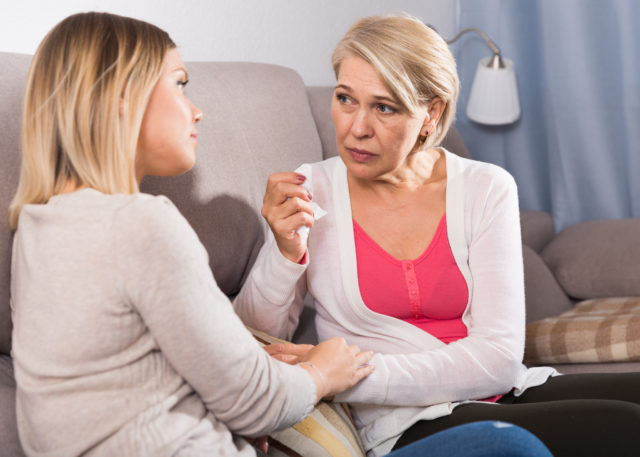Counsellor Fiona Caine offers guidance to a woman whose mother-in-law has become over-reliant following a health scare.
The problem
“My mother in law was quite ill last year and as she was left feeling very shaky, my husband and I moved her in with us. Other than a couple of bouts when she’s felt a bit faint, she’s been fine, although she now has to take ongoing blood pressure medication. She’s only 62 and, other than her blood pressure problems, is generally quite healthy, but as she and I have always got along well, I was quite happy for her to stay.
“Since she’s moved in though, she’s changed – she’s lost her confidence and refuses to go out on her own. I wouldn’t mind that so much except she gets panicky and tearful if she’s left alone in the house. If we’re around, she seems fine and has transformed our garden with the hard work she’s put into it but, if we want to go out, she takes to her bed saying she’s ‘not feeling too good’.
Read: How to recognise depression
“It’s putting a great strain on the whole family – especially me, as I am expected to look after her. When I agreed that she could stay I had no idea that she would become this dependent on me and, although I love her, I feel trapped and resentful. Is it wrong to feel like this?”
Fiona says
“No, it’s not wrong of you to feel trapped. You have every right to expect a life of your own, especially as nobody could have predicted that your mother-in-law would react this negatively to her condition. It sounds as though her problems are perhaps now more emotional than physical. She’s very young to be behaving like this and her behaviour is very selfish – although I’m sure she doesn’t realise it.
Read: How to get better at saying no
“From the behaviour you’re describing, I suspect your mother-in-law might be suffering from depression. Spending too much time in bed, together with tears and panic attacks, indicate she’s very frightened. She’s probably scared of being on her own and having another attack.
“If her only physical problem is blood pressure then normally this is controlled through a combination of medication, diet and exercise. There’s no physical reason why she should become so dependent on you. But – and it’s a big but – depression is a very real illness, and it may be she’s been affected by it for some time.

“I’m guessing she’s lived on her own prior to this – you don’t mention a father-in-law living with you as well. I don’t know if she was alone through being widowed or divorced, but it’s possible that her loneliness is at the root of the problem. Can you talk to her? I suspect she’s not been able to have a conversation with anyone about her emotional needs for a long time.
“She’s young enough to find another relationship if she wanted to, and it might be worthwhile encouraging her to think about getting out and about with a group of others. There are plenty of clubs and organisations she could join where she’d be made welcome and might make new friends. She could join a gym, a walking group or even find a part-time job.
Read: Dear Fiona: Caring for my elderly relative is so exhausting
“She seems to have a real interest in and talent for gardening – perhaps there’s a hospice or other charitable organisation close by that could do with her help. Trying to encourage her to feel good about herself again and feel she’s achieving things would be, I think, the root to building her self-confidence once more. Once she feels more positive, I’m sure she’ll be fine about you leaving her in the house on her own – she might even feel strong enough to move back to her own home eventually.
“You may also find it helpful to look at the website for the Carers Australia where you can find information for unpaid carers and look at the projects and programs that they run. Chatting with others who are facing similar problems might help you to cope with this situation better.”
If you have a problem you need help with, email Fiona by writing to help@askfiona.net for advice. All letters are treated in complete confidence and, to protect this privacy, Fiona is unable to pass on your messages to other readers. Fiona regrets that she cannot enter into personal correspondence.
What advice would you give in a situation like this? Why not share your thoughts in the comments section below?
– With PA


Fiona gave much great advice, but if none works, you might be able to try this:
Contact various ‘Home Care Assistance Services for Elderly Australians’ and organised a carer to ‘baby-sit’ her when you want to go out.
Chances are your M-I-L could get a home-care package to pay for it.
And hopefully, it will give you the freedom you desire and deserve.
It is no small thing to take her into your home.